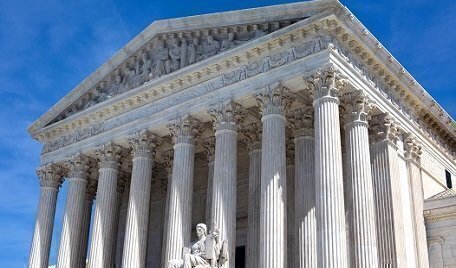On Friday morning, the Supreme Court decided against a Virginia man’s claim that he faced double jeopardy because he faced multiple trials related to one incident.
 In Currier v. Virginia, the Court looked at a concept called issue preclusion and the legal idea that a defendant can’t be tried for the same issue in more than one criminal trial. But what happens when a defendant, charged with three crimes related to an incident, agrees to a separate trial for one of those three crimes?
In Currier v. Virginia, the Court looked at a concept called issue preclusion and the legal idea that a defendant can’t be tried for the same issue in more than one criminal trial. But what happens when a defendant, charged with three crimes related to an incident, agrees to a separate trial for one of those three crimes?
Michael Currier was arrested after a safe full of cash and 20 firearms was stolen from a house. Currier faced three charges: breaking and entering; grand larceny; and possessing a firearm after being convicted of a felony. Both sides agreed to have two trials. The first trial dealt with the breaking and entering, and grand larceny charges. The second trial dealt with the felon-possession charge, which avoided having Currier’s prior conviction introduced in the first jury trial.
In the first trial, the prosecution introduced an eyewitness account of Currier in a vehicle at house and a co-defendant said Currier took part in the break-in. Currier’s defense said he was not at the scene. The jury found Currier not guilt based on the evidence presented at trial.
Currier then objected to the second trial, claiming he was being tried twice on the same facts. A state court ruled that Currier wasn’t facing harassment and the second trial was proper because it protected Currier from testimony about this prior conviction in the first trial. It allowed the second trial to proceed, where a jury, hearing the evidence presented in a different way, convicted Currier and he was sentenced to five years in prison.
In the Court’s 5-4 majority opinion, Justice Neil Gorsuch said “because Mr. Currier consented to a severance, his trial and conviction on the felon-in-possession charge did not violate the Double Jeopardy Clause, which provides that no person may be tried more than once ‘for the same offence.’” The Court’s four other usually conservatives Justices joined in the majority opinion.
Gorsuch dismissed Currier’s claims that “he had no choice but to seek two trials, because evidence of his prior convictions would have tainted the jury’s consideration of the burglary and larceny charges. This is not a case, however, where the defendant had to give up one constitutional right to secure another. Instead, Mr. Currier faced a lawful choice between two courses of action that each bore.”
In the dissent, Justice Ruth Bader Ginsburg said that she “would hold that Currier’s acquiescence in severance of the felon-in-possession charge does not prevent him from raising a plea of issue preclusion based on the jury acquittals of breaking and entering and grand larceny.”
“The government should not be permitted to show in the felon-in-possession trial what it failed to show in the first trial, i.e., Currier’s participation in the charged breaking and entering and grand larceny, after a full and fair opportunity to do so,” she concluded.
Scott Bomboy is editor in chief of the National Constitution Center.







